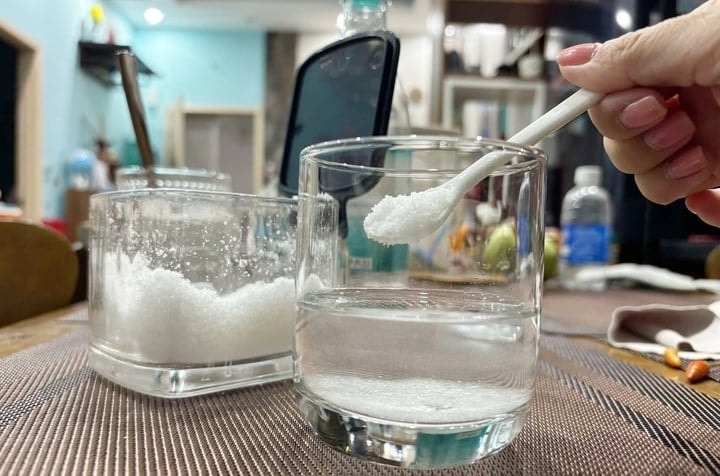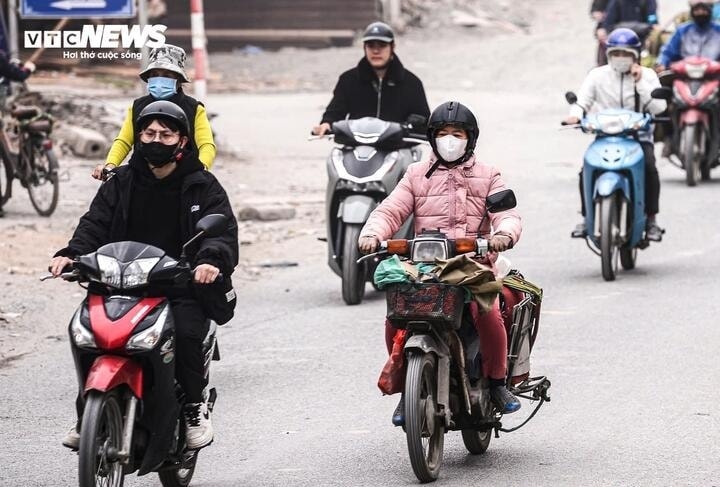Hanoi's very poor air quality in recent days, combined with dry weather, has caused many people to suffer from respiratory diseases.

For the past three weeks, Ms. Ha Nhung, 34 years old, Hanoi has had to constantly turn on the air purifier to escape the stuffy nose and sore throat caused by the dry weather, plus the very poor air quality.
All three members of her family have recently suffered from respiratory illnesses. Her 5-year-old son has severe bronchitis and has to wash his nose and take antibiotics continuously. Her husband works as a delivery man and is often on the road, so he has allergic rhinitis and acute pharyngitis. He has to gargle and take high doses of antibiotics.
Ms. Nhung herself has a history of sinusitis, and recently started having symptoms of nasal congestion and difficulty breathing.
“Every year at this time of year, my family has respiratory problems, but this year the symptoms are worse, partly because of the dry weather and poor air quality,” said Ms. Nhung.
Having lived in Hanoi for many years, Ms. Nguyen Thi Tham (58 years old, Ha Dong, Hanoi) has clearly felt the changes in the air and weather in the past few years. Her two children were recently hospitalized for bronchitis, allergic rhinitis with high fever.
Her husband works as a construction manager and often has to leave the house early in the morning, but instead of breathing fresh air, he has to face dense fine dust. Recently, he has been suffering from hives, burning eyes, sore throat, and difficulty breathing.
Worried that her husband's health was being seriously affected by the poor air quality, Ms. Tham bought anti-dust masks and saline to clean her eyes and nose, but the improvement was not significant. The itching caused by hives also became worse, so the doctor had to prescribe allergy medicine.
Fed up with the daily exposure to pollution, many times Ms. Tham and her husband considered returning to the countryside to live.

According to the IQAir air monitoring system, with an AQI of 219, on January 8, Hanoi ranked second in the list of the most polluted cities in the world, with air quality in the purple zone, the "very bad" level. A measuring station in Tay Ho district (Hanoi) even recorded an AQI of 324, brown, the "dangerous" level.
According to the report on air quality developments of the Ministry of Natural Resources and Environment, in recent times, air pollution in Hanoi has tended to increase, with times when the air quality index (AQI value) reached a bad level.
Although air pollution varies seasonally and is affected by climate and weather conditions, monitoring data from the Ministry of Natural Resources and Environment shows that air pollution has gradually increased, affecting human health and socio-economic development activities.
The World Health Organization assesses that exposure to air pollutants increases the risk of acute respiratory infections, chronic obstructive pulmonary disease, asthma, cardiovascular disease and stroke. In addition, air pollution can cause skin damage, eye diseases, impact the nervous system, immune system, and affect mental health.
The Ministry of Health recommends preventive measures to protect health when the air quality index is at "bad" (AQI 151-200) and "very bad" (AQI 201-300). People need to monitor daily air quality information to take appropriate protective measures.
"When the air quality index is at a very poor level (AQI at 201-300), people should limit outdoor activities or participate in strenuous physical activities. If they have to work or do outdoor activities, they should arrange and choose a time of day when there is less pollution, need to rest more, and perform activities at a moderate intensity," the Ministry of Health recommends.
At the same time, people should limit opening windows and doors when the air is heavily polluted, especially families living near traffic routes. It is necessary to clean the nose and gargle with saline in the morning and evening, especially after going out; wash the eyes with saline in the evening before going to bed.
Additionally, when the air quality index is at very poor levels (AQI at 201-300), sensitive people should avoid all outdoor activities, switch to indoor activities or change to another day when the air quality index is better.
If you experience acute symptoms such as difficulty breathing, cough, or fever, you should immediately go to a medical facility for examination, consultation, and treatment. Do not self-medicate at home. Getting medical examination and treatment according to the prescribed regimen are two important considerations for people with chronic lung disease.
Hanoi's air quality is expected to worsen from October 2024, when the weather changes and winter approaches. The Ministry of Natural Resources and Environment and Hanoi are taking steps to reduce emissions. With the largest source of emissions coming from transportation, Hanoi is developing a plan for a low-emission zone.